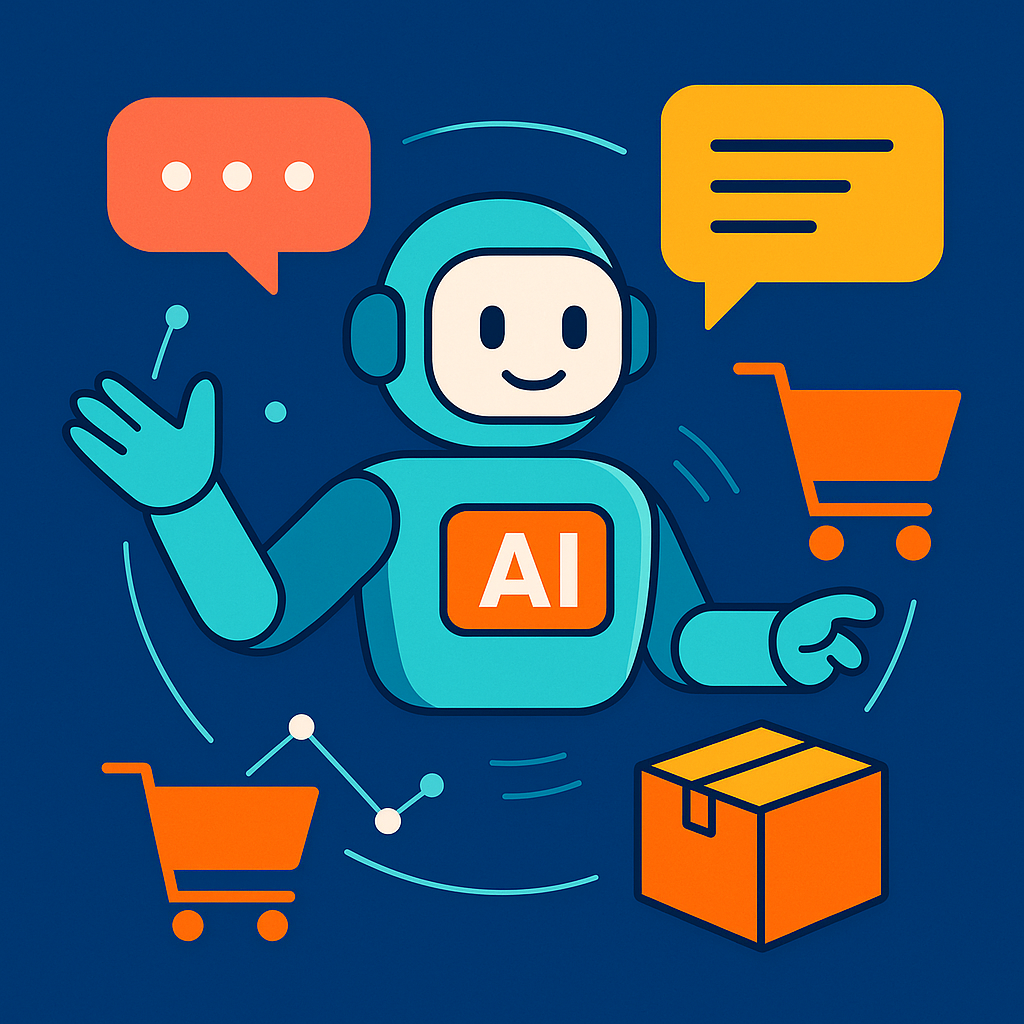Table of Contents
- Introduction: Why eCommerce Needs an AI Agent
- Understanding AI Agents — Definition & Role
- Benefits of AI Agents in Workflow Automation
- How to Implement AI Agents — Step‑by‑Step
- Enhancing Customer Experience with AI Agents
- Overcoming Challenges: Data Security & Human Touch
- Real Success Case Studies of AI Agent Implementation
- Future Trends: Predictive AI & AR Shopping
- Conclusion & Next Steps
- Q&A
Introduction
Overview of eCommerce Transformation
The landscape of eCommerce has significantly transformed over the past decade. Consumers now expect seamless shopping experiences, personalized interactions, and instant gratification. As more businesses shift online, standing out becomes crucial. This challenge has prompted many retailers to embrace advanced technologies to streamline operations and bolster customer engagement. Explore McKinsey’s insights on AI in e‑commerce.
Role of AI Agents in Workflow Automation
Enter AI agents — the silent partners reshaping eCommerce workflows. These digital assistants handle tasks that were once time-consuming and labor-intensive, allowing human workers to focus on strategic initiatives.
AI agents can:
- Analyze customer data for targeted marketing
- Automate inventory management
- Enable real-time customer support
For instance, a company implementing an AI agent can respond to customer queries 24/7, enhancing satisfaction while reducing operational costs. Clearly, AI agents play a pivotal role in driving eCommerce evolution.

Understanding AI Agents
Definition and Functionality of AI Agents
AI agents are sophisticated software programs designed to simulate human interactions and decision-making processes. They utilize algorithms and machine learning techniques to analyze data, learn from experiences, and perform tasks autonomously. Imagine having an assistant that not only understands customer preferences but also predicts their needs.
These agents can:
- Process vast amounts of data quickly
- Engage in natural language conversations
- Automate repetitive tasks
Benefits of Implementing AI Agents in eCommerce
The implementation of AI agents in eCommerce opens doors to a myriad of benefits.
Some key advantages include:
- Cost Efficiency: Reducing labor costs by automating customer service.
- Enhanced Customer Engagement: Providing personalized shopping experiences that increase retention.
- Improved Operational Efficiency: Automating inventory tracking and order processing.
By leveraging AI agents, businesses not only streamline operations but also build stronger relationships with consumers, ultimately driving sales and growth.

Implementing AI Agents in eCommerce Workflow Automation
Identification of Workflow Gaps
To effectively implement AI agents, businesses first need to identify specific workflow gaps. This involves analyzing current processes to pinpoint inefficiencies or repetitive tasks draining resources. A practical approach is conducting a thorough audit of customer touchpoints and internal operations, allowing companies to visualize pain points.
Integration of AI Agents for Process Enhancement
Once gaps are identified, integrating AI agents becomes the next step. These agents can be programmed to automate:
- Inventory management
- Customer inquiries
- Order processing
For instance, deploying an AI agent to handle customer inquiries can drastically cut down response times, enhancing user satisfaction.
Training and Optimization of AI Agents
Training and optimization follow integration. AI agents learn through interaction, meaning continuous data input is vital. Regular training sessions help refine their performance based on customer feedback and operational changes. The more they learn, the more effectively they can manage tasks, ensuring that eCommerce businesses are not only efficient but also equipped to adapt to evolving market demands.

Enhancing Customer Experiences with AI Agents
Personalization and Recommendations
As eCommerce continues to evolve, harnessing the power of AI agents to enhance customer experiences is becoming essential. One standout feature is their ability to provide personalized recommendations. By analyzing customer behavior and preferences, AI agents can curate tailored product suggestions that match individual tastes.
For example, if a shopper frequently buys eco-friendly products, the AI agent can highlight similar items, increasing the likelihood of additional purchases.
Key personalization tactics include:
- Behavior-based recommendations
- Customized marketing messages
- Targeted discounts and promotions
Automation of Customer Support Services
In addition to personalization, AI agents can significantly improve customer support services. Automating these interactions helps businesses respond to queries instantly, offering 24/7 assistance without the constraints of human availability.
Benefits of automating customer support services include:
- Quick response times
- Consistent service quality
- Handling high volumes of inquiries
By merging personalization with automated support, eCommerce businesses can build stronger customer relationships and foster loyalty, ultimately driving growth in a competitive marketplace.
Overcoming Challenges in AI Agent Implementation
Data Security and Privacy Concerns
Despite the advantages of AI agents, implementing them does come with challenges, notably regarding data security and privacy. As these agents collect and analyze vast amounts of customer data, businesses must ensure robust security measures are in place.
Steps to enhance data security may include:
- Employing encryption techniques
- Regularly auditing data access permissions
- Educating staff about data privacy regulations
For instance, a friend’s eCommerce startup faced a data breach scare, prompting them to rethink their data handling practices, ultimately strengthening customer trust.
Maintaining Human Element in Customer Interactions
Another significant challenge is maintaining the human element in customer interactions. While AI agents can handle routine inquiries effectively, they sometimes falter in connecting emotionally with customers.
To bridge this gap, companies can:
- Offer a seamless transition to human agents for complex issues
- Train AI to recognize when a human touch is needed
By addressing these challenges, businesses can create a balanced eCommerce environment where technology and personal interaction coexist harmoniously, fostering customer satisfaction and loyalty.

Case Studies: Successful Integration of AI Agents in eCommerce
Company A: AI Agent Implementation Strategy
Examining successful AI agent implementations offers valuable insights. Company A, a leading online retailer, adopted an AI agent strategy aimed at enhancing customer engagement. They integrated a virtual shopping assistant that helped customers navigate through products based on their preferences.
This approach involved:
- Personalized recommendations
- Real-time inventory updates
- Seamless checkout assistance
Customer feedback indicated a 30% increase in satisfaction, underscoring the effectiveness of their strategy.
Company B: Impact on Operational Efficiency
On the other hand, Company B focused on improving operational efficiency through AI agents. Their implementation automated various backend processes, including order tracking and inventory management.
This resulted in:
- A 40% reduction in order processing times
- Significant cost savings from reduced manual errors
- Enhanced employee productivity by allowing staff to focus on critical tasks
Both companies illustrate how thoughtful integration of AI agents can dramatically transform eCommerce operations, providing a roadmap for other businesses looking to follow suit.

Future Trends in AI Agent Technology for eCommerce
Predictive Analytics and Machine Learning
As AI agent technology evolves, one of the most exciting trends is the integration of predictive analytics and machine learning. These advancements allow AI agents to not only analyze past customer behaviors but also forecast future buying patterns. Imagine an AI agent that can suggest products before customers even realize they need them.
Key benefits of this approach include:
- Increased conversion rates through timely suggestions
- Improved inventory management by predicting demand
- Enhanced customer satisfaction with tailored offers
For example, a colleague’s retail business used predictive analytics to anticipate seasonal spikes, ultimately reducing excess inventory costs.
AI Agents in Augmented Reality Shopping Experiences
Another groundbreaking trend is the use of AI agents within augmented reality (AR) shopping experiences. This technology allows customers to visualize products in their own environment before making a purchase.
For instance, an AI agent can help a customer see how a piece of furniture looks in their home through AR on their mobile device, making the shopping experience immersive and interactive. This blend of AI and AR promises to:
- Enhance customer engagement
- Reduce return rates by enabling informed buying decisions
- Provide a unique shopping experience that stands out in a crowded market
With these innovations on the horizon, the future of eCommerce is set to become more personalized, efficient, and engaging than ever before.

Conclusion and Future Outlook
Summary of Benefits of AI Agents in eCommerce Transformation
As we reflect on the transformative impact of AI agents in eCommerce, it’s clear that their benefits are substantial. From personalized customer interactions to efficient workflow automation, AI agents are reshaping the retail landscape.
Key benefits include:
- Enhanced customer satisfaction through tailored experiences
- Increased operational efficiency via automation
- Improved decision-making through data insights
For instance, a friend’s eCommerce store saw a 25% increase in sales after implementing an AI agent, demonstrating just how powerful these tools can be.
The Road Ahead: Evolution of AI Agents in Workflow Automation
Looking forward, the evolution of AI agents in workflow automation is poised for significant advancements. As technologies like predictive analytics and augmented reality become more mainstream, AI agents will become even more integral to eCommerce strategies. This integration promises to foster greater customer connections, streamline operations, and ultimately drive business growth. With constant innovation, the future of AI in eCommerce is not just bright; it’s boundless.
Q&A Section
Q1: What are AI agents?
A: AI agents are autonomous software systems that perceive their environment, make decisions, and act toward specific goals with limited human intervention. They combine reasoning, learning, and adaptability to achieve purposeful, self-directed outcomes.
Q2: What distinguishes AI agents from traditional rule-based systems?
A: Unlike rule-based systems, AI agents use large language models (LLMs), machine learning, and NLP to interpret data, adapt in real time, and make autonomous decisions based on dynamic conditions and user goals.
Q3: What are the main types of AI agents?
A: Common categories include:
- Simple Reflex Agents
- Model-Based Reflex Agents
- Goal-Based Agents
- Utility-Based Agents
- Learning Agents
- Collaborative Agents
Q4: What capabilities define AI agents?
A: Key features include:
- Autonomy
- Goal orientation
- Adaptability
- Reasoning
- Learning
- Collaboration with other systems or agents
Q5: What is the AI agent lifecycle?
A: The lifecycle involves:
- Perception – Gathering data from the environment
- Interpretation – Using NLP and analytics
- Decision-Making – Choosing optimal actions
- Action – Executing commands or responses
- Learning – Improving through feedback and outcomes
Q6: What are examples of AI agents in action?
A: Examples include:
- Virtual HR agents
- Dynamic pricing tools
- Adaptive logistics systems
- Self-driving vehicles
- E-commerce assistants (e.g., order tracking, personalized recommendations)
- Smart thermostats and spam filters
Q7: How are businesses using AI agents today?
A: Enterprises are deploying AI agents across functions like HR, sales, marketing, logistics, customer service, and finance. Use-cases range from onboarding automation and sentiment analysis to predictive inventory management and real-time support.
Q8: What benefits do AI agents offer?
A: Core benefits include:
- Reduced operational costs
- Scalable operations
- Improved customer satisfaction
- Faster decision-making
- 24/7 support capabilities
Q9: How should businesses implement AI agents?
A: Start by identifying high-value, well-defined use-cases. Implement agents gradually, test effectiveness, and then scale across departments. Prioritize integration, governance, and human oversight.
Q10: What is the future outlook for AI agents?
A: AI agents are becoming foundational to enterprise AI strategy. Their evolving autonomy and adaptability suggest they’ll play central roles in transforming workflows, scaling businesses, and enhancing customer experiences across industries.


